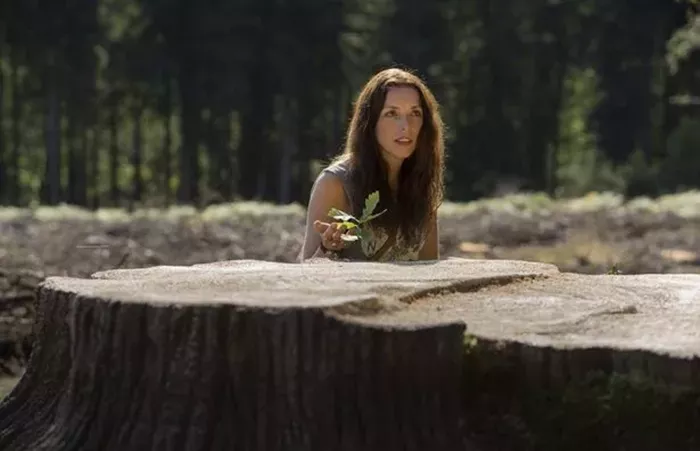The second season of The Change, Bridget Christie’s groundbreaking feminist sitcom, picks up right where the first series left off. Linda (Christie), our menopausal protagonist, remains firmly rooted in the Forest of Dean, dressed as the Eel Queen and embracing the joy of her personal transformation. Despite the attempts of her bumbling husband, Steve (Omid Djalili), to bring her back home, Linda stands firm, still determined to live her life on her own terms. As the series unfolds, Linda continues to resist the pressures of domestic life, having used only a fraction of the time she has earned after decades of unpaid labor.
But The Change is about much more than just menopause. Christie’s vibrant series tackles a wide range of themes, including witchcraft, feminism, activism, the climate crisis, and the inequalities of everyday life. The second season delves deeper into Linda’s newfound sense of self, as she begins to plant roots in her community and inspire a grassroots movement that grows throughout the episodes. By the final episode, the town is buzzing with women who have taken up Linda’s cause—logging household chores, donning “Je suis Linda” T-shirts, and even playing pool before noon. The men, once dismissive, eventually concede and sign up for the “For Men Who Wipe” housework program, led by the infamous Pig Man. Meanwhile, the mother oak tree that was felled in the first series begins to sprout new life, symbolizing the growth of Linda’s vision.
Yet, not all is harmonious. As Linda becomes the town’s outspoken advocate for domestic equality, tensions rise. The Verderer, a disgruntled and aptly named character, demands a public trial to decide Linda’s fate. In a powerful moment, Linda defends her cause in a speech that touches on the everyday struggles of women, even comparing the act of shaking crumbs from a toaster to the invisible labor that women endure daily. The trial results in a narrow vote: Linda stays, and the absurdity of the situation mirrors the farce of political debates like Brexit.
The series continues to explore themes of natural phenomena and societal rituals, with episodes titled after concepts like “Mycelium” and “Psilocybin.” Linda’s chore ledger takes on new significance as the town’s women begin to ask thought-provoking questions about what counts as labor, leading to some hilariously awkward moments. Meanwhile, the men’s attempt to replace their beloved eels with vegan alternatives culminates in a surreal and psychedelic adventure that could easily belong in a Ken Russell film.
Amidst the chaos, Linda’s relationship with her family becomes increasingly complicated. Her domineering sister Siobhain (Liza Tarbuck) and the men in her life face their own midlife crises, and tensions reach a boiling point when the men begin to use the same cloth to wipe everything in sight—a detail that becomes a running gag throughout the season.
What makes The Change so unique is its ability to combine absurd humor with sharp social commentary. Christie’s brand of humor is distinctly British, filled with references to zoologists and TV presenters, as well as poignant observations about the national character. But beneath the comedy lies a serious critique of the societal structures that continue to oppress women and hinder progress. In her vision of Britain, local funding is channeled toward compensating women for domestic labor, and mushrooms, of all things, provide valuable lessons in sustainability and resilience.
The season concludes on a hopeful note, with Linda once again inspiring a movement that transcends the personal to become a force for change. Through a celebration around the mother tree, Linda delivers a moving speech about life’s natural cycles and the possibility of living with purpose, despite the inevitability of death. The series ends in jubilant celebration, leaving viewers eagerly anticipating the next chapter of Linda’s journey—and, perhaps, a future season.
The Change has proven itself to be more than just a sitcom; it is a poignant exploration of the intersection of feminism, ecology, and societal change, all wrapped in a delightfully surreal package. Christie’s ability to tackle heavy issues with humor and heart has made the series a standout in the world of television. If season two is any indication, the movement Linda has started is only just beginning.
Related topic:
“The Four Seasons” Comedy Series to Premiere on Netflix in May
‘Presumed Innocent’ Shifts to Limited Series for 2025 Emmys
Kat Dennings Talks “Shifting Gears” Finale and Hopes for Season 2

